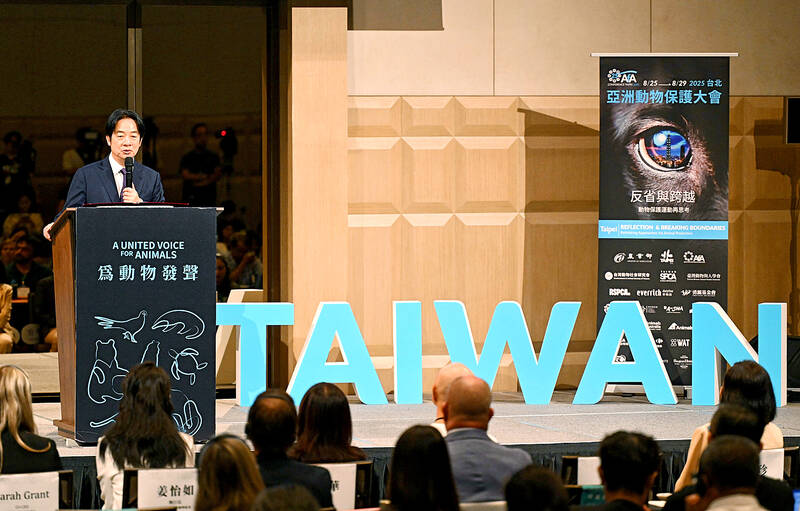President William Lai (賴清德) yesterday lauded Taiwan’s progress in animal protection, including the landmark end to the euthanasia of stray animals, at an international animal welfare conference in Taipei.
“Our central and local governments have continued to work with animal protection groups to promote a humane capture-neuter policy to reduce the stray animal population,” Lai said at the opening of the Asia for Animals Coalition (AfA) Conference.
Lai recalled that before his tenure as mayor of Tainan from 2010 to 2017, more than 12,000 stray animals were euthanized each year in the southern city.

Photo: Chang Chia-ming, Taipei Times
“But we achieved zero euthanasia, out of respect for life,” Lai told more than 600 animal welfare advocates from more than 30 countries at the conference, adding that every animal in Taiwan is now “fully protected” by law.
Taiwan formally banned the euthanasia of strays in 2017, after an amendment to the Animal Protection Act (動物保護法) required all public shelters to cease the practice.
Lai also pointed to more recent milestones, including the establishment of the Department of Animal Welfare under the Ministry of Agriculture in 2023 and last year’s amendments to regulations on animal exhibitions to “strengthen welfare standards and inspection mechanisms.”
AfA cochief executive officer Sirjana Nijjar expressed her “heartfelt gratitude” to Lai, saying that it was the first time in her career she had seen a president attend an animal protection conference, “truly showcasing your commitment to the cause of animals.”
Responding to Lai’s remarks, Chu Tseng-hung (朱增宏), executive director of Environment and Animal Society of Taiwan, said in his keynote speech that Taiwan’s stray dog problem remains unresolved, describing progress as “one step forward, one step back.”
The estimated number of stray dogs has fluctuated over the past seven years: 146,773 in 2018, 155,869 in 2020, 159,697 in 2022 and 141,584 in 2024, ministry data showed.
Chu said that the stray dog situation has also created conflicts with wildlife conservation, urging advocates for companion animals and those focused on wild species to “consider the animals that others care about.”
He described the ministry’s approach as “tokenism,” saying that although the Food and Agricultural Education Act (食農教育法) has included animal welfare provisions since 2022, its implementation has so far been largely superficial.
“Every day, more than 10,000 pigs are sent to live auction markets, which is extremely cruel,” he said.
He showed a video from the markets depicting practices such as electric prodding, and pigs being piled and rammed against one another.
On poultry farming, Chu said that more than 70 percent of Taiwan’s egg-laying hens are still confined to cages with limited space rather than being raised in cage-free systems.
First held in 2001, the AfA Conference has been convened biennially in different cities across Asia, with Taiwan hosting for the first time this year.
Under the theme “Reflection and Breaking Boundaries,” the three-day event — running from yesterday through tomorrow — features keynote speeches, plenary sessions and workshops on a wide range of animal welfare issues.

The manufacture of the remaining 28 M1A2T Abrams tanks Taiwan purchased from the US has recently been completed, and they are expected to be delivered within the next one to two months, a source said yesterday. The Ministry of National Defense is arranging cargo ships to transport the tanks to Taiwan as soon as possible, said the source, who is familiar with the matter. The estimated arrival time ranges from late this month to early next month, the source said. The 28 Abrams tanks make up the third and final batch of a total of 108 tanks, valued at about NT$40.5 billion

A group from the Taiwanese Designers in Australia association yesterday represented Taiwan at the Midsumma Pride March in Melbourne. The march, held in the St. Kilda suburb, is the city’s largest LGBTQIA+ parade and the flagship event of the annual Midsumma Festival. It attracted more than 45,000 spectators who supported the 400 groups and 10,000 marchers that participated this year, the association said. Taiwanese Designers said they organized a team to march for Taiwan this year, joining politicians, government agencies, professionals and community organizations in showing support for LGBTQIA+ people and diverse communities. As the first country in Asia to legalize same-sex

MOTIVES QUESTIONED The PLA considers Xi’s policies toward Taiwan to be driven by personal considerations rather than military assessment, the Epoch Times reports Chinese President Xi Jinping’s (習近平) latest purge of the Chinese People’s Liberation Army (PLA) leadership might have been prompted by the military’s opposition to plans of invading Taiwan, the Epoch Times said. The Chinese military opposes waging war against Taiwan by a large consensus, putting it at odds with Xi’s vision, the Falun Gong-affiliated daily said in a report on Thursday, citing anonymous sources with insight into the PLA’s inner workings. The opposition is not the opinion of a few generals, but a widely shared view among the PLA cadre, the Epoch Times cited them as saying. “Chinese forces know full well that

An elderly man with underlying health conditions died in mid-January, eight days after the onset of symptoms, marking Taiwan’s first hantavirus death this year, the Centers for Disease Control (CDC) said yesterday. The man, who was in his 70s and lived in Taipei’s Daan District (大安), tested positive posthumously for hantavirus after passing away on Jan. 13 from sepsis complicated by multiple organ failure and pneumonia, the CDC said in a press release. According to the CDC, the man sought treatment on Jan. 6 for respiratory issues and low blood pressure before returning two